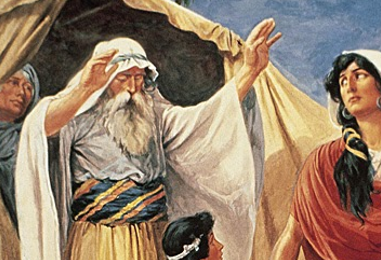Is the heavenly Jerusalem our mother?
27-01-2018 - Posted by Andre PietIn Galatians 4 Paul supports his argument against the false teachers in Galatia, with an illustration from the book of Genesis. A history that he typologically, or, as Paul literally puts it himself (4:24), reads allegorically. Not instead of history but as a deeper layer under this history.
Paul records the Egyptian slave Hagar as a type of Mount Sinai in Arabia. Both lead to slavery. A rather firm statement from the apostle. Elsewhere (2Cor.3: 6) he states: “the letter kills”, meaning the letters engraved on the stone tablets, which condemned the people and actually killed three thousand men among them. Hagar stands for “the flesh”: the human constructions to help God in the fulfillment of his promise. As Israel vowed unanimously at Mount Sinai: all that YAHWEH has spoken WE will do (Exodus 19:18). It is this covenant that was intended from the outset to be replaced by a new and unconditional covenant. Abram’s dealings with Hagar typifies the Sinai covenant of the law. GOD would put an end to that by making the promised seed of Abraham born, beyond any human capacity. Abraham and Sarah were ‘dead’ but God begot life from the dead. As Hagar portrays slavery and carnal efforts, Sarah represents the freedom and promise that GOD himself fulfills.
Hagar is in Paul’s explanation, “in line with the Jerusalem which now is” (4:25). Paul is referring to the city as a religious center of Judaism. This city is in slavery with its children, as was the case at the time with Hagar and Ishmael. And then Paul writes in verse 26:
But the upward Jerusalem is free, who is mother of us all.
The translation above differs from the usual translations. This is how the NIV and ISV read:
But the Jerusalem that is above is free, and she is our mother. NIV
But the heavenly Jerusalem is the free woman, and she is our spiritual mother. ISV
What is striking is that the common translations speak of a city that is above or in heaven. Yet that is not the meaning of the preposition of which “heavenly” and “that is above” are the representation. The Greek word ‘anoo’ means primarily: ‘upwards’ (see John 11:41). ‘Anoo’ is the opposition of the preposition ‘kata’ that means ‘downwards’. ‘Anoo’ indicates a direction. Paul does not refer to a Jerusalem that is above but to a Jerusalem that is directed upwards.
There is something more that is striking about the contradiction Paul makes. In verse 25 he speaks of “the present Jerusalem”. You would expect that in contrast to this he would speak about “the future Jerusalem”. But he does not call it that. He speaks of “the upward Jerusalem”. Is Paul mistaken here? No, certainly not. For the future Jerusalem is the upward-facing Jerusalem. As “the present Jerusalem” is focused on “the flesh”, in the future the city will be focused on the above! Paul is referring to the restored Jerusalem in the Messianic kingdom. This is shown by the quote he gives in verse 27:
For it is written, “Be glad, barren one, who art not bringing forth! Burst forth and implore you who are not travailing! For man are the children of the desolate, rather than of her who has the husband.
Paul supports his statement about “the upward Jerusalem” with a quote from Isaiah 54 describing the future restoration of the city of Jerusalem (see also Isa.62: 1-5). It is about the geographical Jerusalem that will be restored in glory after it has come to recognition of its Messiah. Isaiah 54 is fulfilled when the people will accept the confession of Isaiah 53 (“He was pierced for our transgressions …”). Isaiah 54 does not speak of a Jerusalem that is above, but of a Jerusalem that expects it from above!
Perhaps one question remains with this explanation: how can a future city of Jerusalem be our mother? My answer is: not (the future) Jerusalem is our mother but the free woman, Sara. Hagar is a type of the present Jerusalem. On the other hand, Sarah is a type of the future, upward-facing Jerusalem. And she, Sara is our mother.
I quote Galatians 4:26 again:
But the upward Jerusalem is free, who is mother of us all.
The “free” in this passage (:22,23,26,30,31) is consistently Sara, for five times in a row. It is also a feminine word. So, Sara is our mother. As Paul ends in 4:31 by declaring:
Wherefore, brethren, we are not children of the maid, but of the free [woman].

 English Blog
English Blog